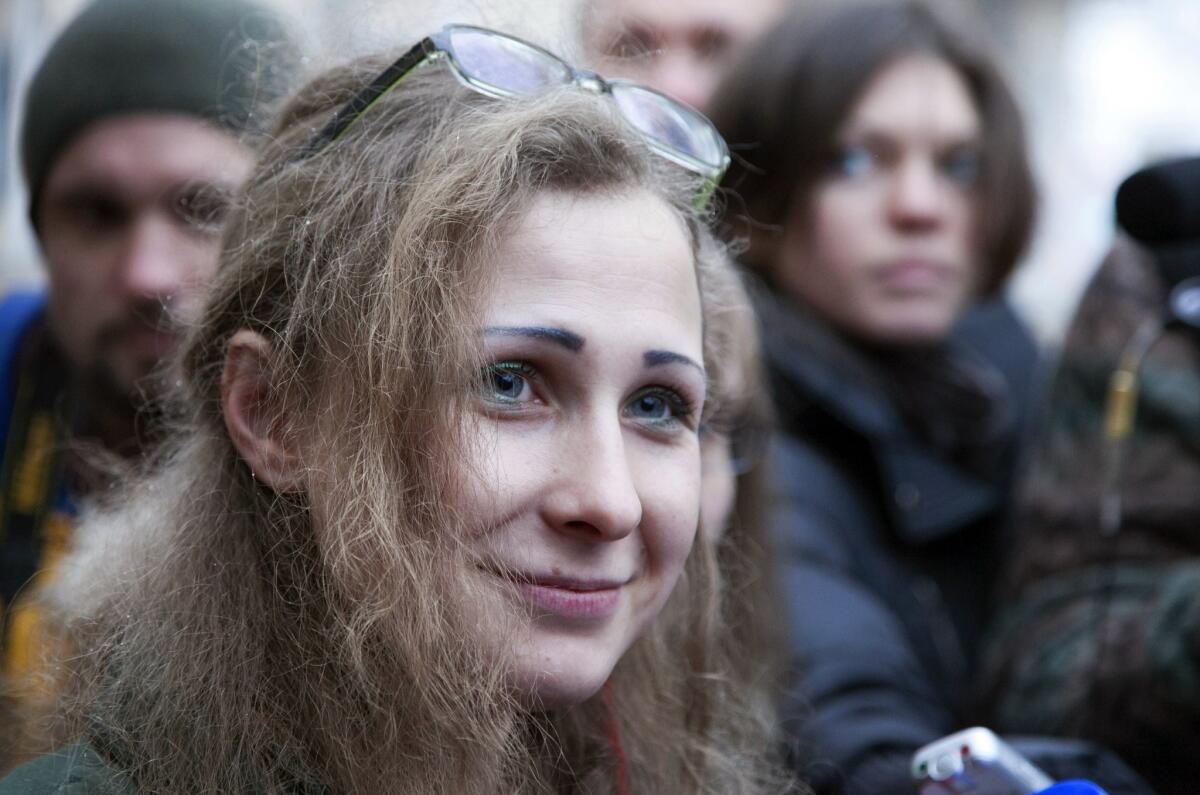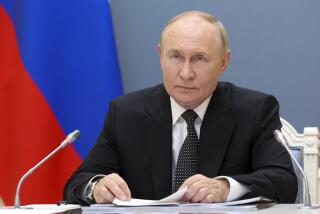Still defiant, members of Russiaâs Pussy Riot band go free

MOSCOW â Two members of the feminist punk-rock band Pussy Riot were freed from prison Monday as part of an amnesty law that one of them immediately denounced as âa profanity.â
The two musicians were released after serving most of their two-year sentences for hooliganism, a charge that stemmed from the âpunk prayerâ they performed denouncing President Vladimir Putin in Moscowâs main Russian Orthodox cathedral in February 2012.
Both women emerged with their defiance intact, vowing to work to promote human rights in Russia. Many observers viewed their release under the amnesty law as a damage-control measure by the Russian government before the start of the 2014 Winter Olympic Games in Sochi.
Their discharge followed that of Mikhail Khodorkovsky, the oil tycoon who was regarded as Russiaâs most prominent political prisoner. He was freed Friday after being granted clemency by Putin, and immediately was taken to Germany.
Pussy Riot member Maria Alyokhina, 25, left a corrective labor colony in the Nizhny Novgorod region of central Russia on Monday morning; her bandmate Nadezhda Tolokonnikova, 24, left a prison hospital in the Kransoyarsk region in central Siberia later in the day.
âMy attitude towards the president hasnât changed,â Alyokhina said in an interview with TV Rain, a private, liberal-leaning television network, upon her release. âIf I had the slightest possibility to reject this mercy, by all means I wouldnât have accepted it.... Nothing depended on me in this case.â
She called the amnesty âa profanity, because it sets free less than 10% of prisoners.â
Until the amnesty bill passed, both Alyokhina and Tolokonnikova were due for release in March.
Both women said they intend to focus on human-rights activities.
âPrimarily I will be protecting the interests of those people in confinement, people with whom I served my term in colonies,â Tolokonnikova told the Itar-Tass news agency.
During their confinement, Alyokhina once complained of being beaten by guards, and Tolokonnikova twice went on hunger strikes to protest harsh working conditions and mistreatment of prisoners in the labor camp. Earlier this year, she complained that her camp administrator threatened to kill her.
Neither woman expressed gratitude to Putin or the government for freeing them.
[Updated 11:25 a.m., Dec. 23: âI donât feel a thing,â Tolokonnikova said in an interview with Echo of Moscow radio station. âThis amnesty is totally ridiculous applied to us a few months before our term expires.â
A Russian political analyst said Putin had lost the momentum to effectively change his countryâs image before the Olympic Games. âThat neither Pussy Riot members nor Khodorkovsky thanked Putin for their early freedom demonstrates that he was doing that not for humanitarian but for pragmatic reasons,â Andrei Piontkovsky, a senior researcher with the System Analysis Institute, a Moscow-based think tank, said in an interview.]
Their lawyer said the amnesty was not the final step in their case. âWe are still appealing their verdict in higher courts and in this sense the act of amnesty doesnât change much, except that my clients are free, which is a great thing in itself,â Irina Khrunova said in an interview. âWe continue to consider the prosecution and the verdict unjustified and we will be struggling to the end to prove them completely innocent of the crime they were convicted of.â
In February 2012, the women were part of a group that performed the âpunk prayerâ at the Cathedral of Christ the Savior. Dressed in gowns and hoods and holding electric guitars, they asked Mother Mary to drive Putin away.
The controversial act took place at the height of Putinâs election campaign. The subsequent prosecution and conviction of the women was widely seen as an act of vengeance on his part.
A third member of the group, Yekaterina Samutsevich, also faced two years of imprisonment, but after her appeal, that sentence was suspended because she didnât take a direct part in the performance.
The Moscow Patriarchy of the Russian Orthodox Church expressed satisfaction with the amnesty and offered a gesture of conciliation.
âWe are happy they were released and although we denounced their blasphemous act, we never insisted that they should have been put in prison to begin with, but it is the way the law is,â Vladimir Vigilyansky, spokesman for the Moscow Patriarchy, said in an interview. âThe doors of our church are always open for them, and should they make a step toward the church, we are ready to make 100 steps toward them.â
More to Read
Sign up for Essential California
The most important California stories and recommendations in your inbox every morning.
You may occasionally receive promotional content from the Los Angeles Times.










